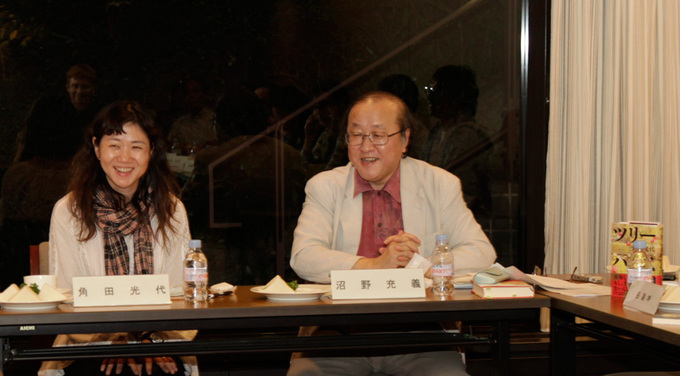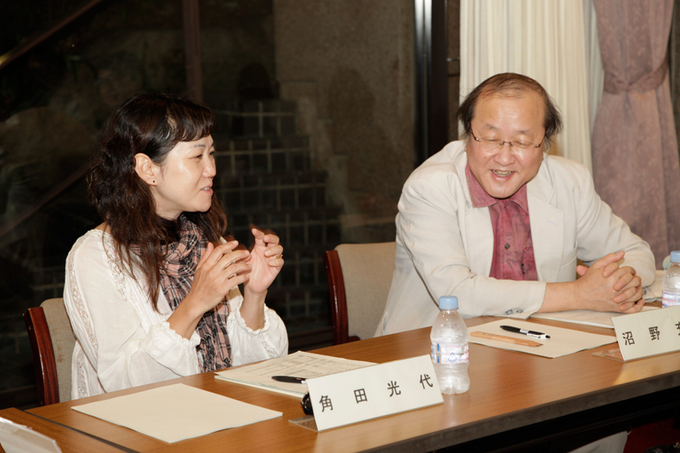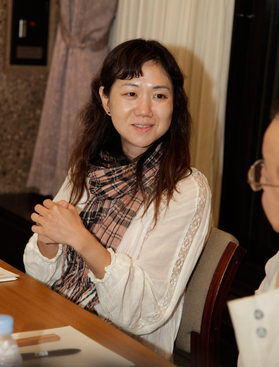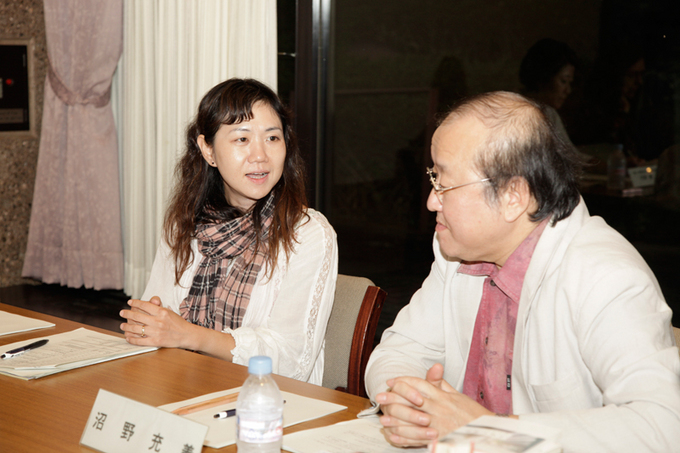What Does It Mean to Live in History? Talking about the Novel Tree House
Mitsuyo Kakuta, Writer
Mitsuyoshi Numano, University of Tokyo
The Japan Foundation publishes Japanese Book News (JBN) to provide information on recent publishing trends and reviews of new titles in Japan mainly to overseas publishers, editors and translators. In connection with this publication, we have organized the "Japanese Book News Salon--a talk session with contemporary Japanese writers," where writers whose works appeared in JBN and translators, as well as aspiring translators, share their thoughts on the novels. For our first session we had Mitsuyo Kakuta, author of Tree House (Bungei Shunju, 2010) introduced in JBN No.68 (June 1, 2011), as our guest with Mitsuyoshi Numano, professor of the University of Tokyo as moderator.
The 1st Japanese Book News Salon
I wanted to write about things that are the exact opposite of ordinary day-to-day events
NUMANO: Kakuta-san, you are one of the best and most widely read writers in Japan today. Recently, your work, Youkame no semi (The Eighth Day), was made into a movie, and you have been featured in the magazines Eureka and Bungei. At a young age, you already have a large collection of work, and write constantly. On top of that, you also work on different types of stories at the same time, such as novels, short stories and short-story serials. I am really amazed at your creative capacity.
Your recent highly acclaimed novel Tree House explored new territory, which must have surprised even your longtime fans. The story, which begins around 1940 and goes up to the 2010s, is a family chronicle spanning more than 70 years that unfolds against the backdrop of historical events during and after the war.
There haven't been many books like this one. What inspired you to write this story?
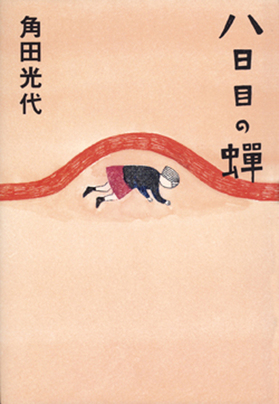
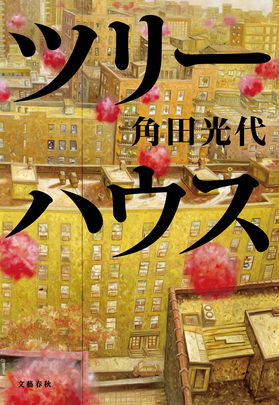
Left: Yokame no semi (The Eighth Day) by Mitsuyo Kakuta (Publisher: Chuokoron Shinsha Inc.)
Right: Tree House by Mitsuyo Kakuta (Publisher: Bungeishunju Ltd.)
KAKUTA: What was going on in literary and publishing circles from the time I made my debut in 1990 to now coincided with what was happening in my own life. Before this novel, I wrote about familiar problems people encounter in today's society. I tried to narrow my focus and look at the small things, not the big ones. That was the literary trend in Japan at the time, and more and more authors began writing about everyday things--what we ordinary people can identify with--rather than about major issues like historical events or social problems.
But I realized that it was getting too crowded and I thought why we all were writing about average things. I knew I was good at describing the little things in life, so all the more, I wanted to write the exact opposite, something out of the ordinary.
At the time I published Tree House, a few other female novelists around my age were also writing about the three generations of a family: grandparents who had survived the war, parents and their children. The fact that a number of women wrote on the same subject at the same time told me that we all felt in a way trapped within the Japanese novel and were trying to break out of that.
NUMANO: In writing Tree House you would have had to visit the locations in the book, and do research, which would be a different challenge from your previous work. Was there anything you found difficult in doing that?
KAKUTA: I didn't study much when I was in school, so I didn't know any history. Since I had to start from an introduction on how the war began, and what it was like, it was hard that I had a lot to learn.
NUMANO: And it's not only the Pacific War, is it? There's also the issue of Manchuria, and the hardships borne by Japanese citizens who had to repatriate. You really have to read a lot of material to take up the subject with confidence.
KAKUTA: I had history books and materials piled up on my desk, and did a lot of reading. But I still can't say that I had a lot of confidence.
Six or seven years ago, when 60 years had passed since the war, some European writers wrote about the war, and it seemed to me that they weren't just talking about the hardships and sufferings, but added fictional elements to create interesting novels. But that kind of writing never happened in Japan.
It made me wonder why even young writers focus only on the pain and describe war as evil. I guess that's because if they wrote in another way, the war survivors now in their seventies and eighties would criticize the narratives saying, "That's not the way it was." That's why authors stop writing about the war. I was afraid that if things stayed as they were, writers younger than me would be even more reluctant to write about that period. Of course I was worried when I released the book that people might say, "It wasn't like that." But I felt that if people condemned my work because I hadn't experienced the war personally, there was no future for this kind of novel.
Do people understand what is really happening when they are in the midst of history?
NUMANO: Your novel Tree House is a chronicle of a family that has been running a Chinese restaurant called Hisui Hanten (Jade Restaurant) in the Shinjuku district of Tokyo for three generations. The tale starts around 1940 with a man and a woman slinking to Manchuria separately; the two meet in Shinkyo (now Changchun), then the capital of Manchuria, and decide to live together--they are the grandparents. After the Soviet army moves into Manchuria, they evacuate, barely escaping with their lives. After making it back to Japan, they open a Chinese restaurant in Shinjuku on a piece of land whose ownership has been obscured in the postwar chaos. Their children are born, and their grandchildren.
The grandson, who is the main character of the story, is in his twenties and doesn't know what he wants to do with his life. He just hangs around the house and in the beginning doesn't know anything about his grandparents, where they came from, or what they had done in their lives. When the grandfather dies, the boy discovers that his grandparents had lived in Manchuria, and decides to travel to China with his grandmother. As the story of their journey unfolds, the grandparents' experiences in Manchuria are recounted chronologically, intercut with the present day narrative of their lives in Shinjuku running the restaurant.
Could you tell me why you chose Shinjuku as the setting for the contemporary part of the story?
KAKUTA: I wanted to include incidents that occurred in postwar Japan. And I thought that Tokyo was the place closest to those events. I mean if you lived in the mountains of Nagano, many of these things would have happened without you even being aware of them. I wanted my characters to come into contact with the history of the Showa era after the war. I selected Shinjuku as the setting for my story because, to my mind, it is the center of Tokyo. I had a hard time choosing which historical episodes to include.
NUMANO: The way you use history as the backdrop is fascinating. The Showa years were very turbulent. There was the Korean War in 1950, rapid economic growth, the United Red Army attacks, and the upsurge of the leftist movement. These events are glimpsed in the background, but the story is about the people of Hisui Hanten, and the focus is on their lives as played out against the backdrop of history.
KAKUTA: I intended to write about the passage of time in a broad sense, but in the process I found myself writing about people's everyday life. That was very interesting.
NUMANO: The novel also touches on ideologies and political issues, such as how to interpret Japan's move into Manchuria. Some say that the "harmony of the five races" concept given as the founding principle for the Manchu state was nonsense, and there are various opinions about that. You've got the campus unrest in the 1960s and political movements. I'm sure you must have had some concerns when writing about these issues, that someone would say, "That's not the way it was," as with the war survivors that we mentioned earlier.
KAKUTA: The materials I read on the war were written from today's point of view, so they say that the war was a bad thing. For example, they say that the Japanese were foolish and wicked to try to create the Manchu state. The radical student movements are described as wrong and irrational. But I thought about my grandparents and parents who had lived through these incidents and wondered whether they really understood what was happening at the time.
Like now, we are told various things about the radiation leaking from the nuclear power plant in Fukushima, but we can't really say anything about it until more time passes. Right now, we are just flooded with information. Not knowing what to do, all we can do is live as we always have, in the same place, doing the same things. I think that is what living in history means. People are just tossed about without being able to really do anything about it. It takes an exceptionally wise person to be able to make judgments of good and bad in these circumstances. An ordinary person occupied with their day-to-day life would be lost, not knowing what was going on. That's what I wanted to describe, the relationship between people and their times.
Is running away from something today different from running away back then?
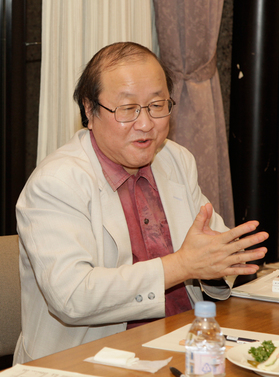 NUMANO: What was impressive and what I liked about Tree House is how "running away," the main theme of the story, is expressed in what the people did. Throughout the story you describe the grandparents going to Manchuria as "running away." When the Manchu state was founded, some people went there aspiring to carry out the founding principle, like political activists; others went as soldiers with a mission. But the grandfather in this novel is neither; the grandmother too went to Manchuria with no particular reason. They meet there and get married. This story structure is very interesting. How did you come up with the idea?
NUMANO: What was impressive and what I liked about Tree House is how "running away," the main theme of the story, is expressed in what the people did. Throughout the story you describe the grandparents going to Manchuria as "running away." When the Manchu state was founded, some people went there aspiring to carry out the founding principle, like political activists; others went as soldiers with a mission. But the grandfather in this novel is neither; the grandmother too went to Manchuria with no particular reason. They meet there and get married. This story structure is very interesting. How did you come up with the idea?
KAKUTA: I wanted a link with the present. I was looking for something to connect these generations, the people who had experienced the war, and the generation slightly younger than myself. I didn't want to portray them as completely alien to each other. Today, many young people are out of work because of the bad economy; there are people called NEETs (not in employment, education or training), and net-café refugees (homeless people living in Internet cafés). If someone told these young people that jobs, excitement, and a good life were waiting for them in some foreign place, I think they would go willingly. But it's just that there's no such place now.
The hasty judgments, the lack of thought, the tendency of young people to think, "Oh, if society wasn't the way it is, things would have turned out differently!" could well have been the same in their grandparents' generation. Regardless of whether that is actually true, I wanted to depict the two generations, the young people and the grandparents, as human beings having the same feelings and thinking in the same way.
NUMANO: One thing common among the three generations is that they are not choosing how to live but rather trying to flee because they don't know what to do. The grandparents, parents, and grandchildren are all running away from something.
But near the end of the story, the grandmother tells her grandson that running away in her time was different from the way today's young people run away. She says that her generation ran away to show their defiance, not that they were really fighting for some ideal or philosophy, but as proof that they were alive. In comparison, young people today, she says, are running away without even trying to make their lives better, escaping without any hope for the future, and are destroying themselves.
KAKUTA: I can't say for sure, but for the grandparents it must have been very difficult to turn their backs on the war. It meant refusing to accept what was happening at the time, and running away was a way to do that. But what does it mean to run away in today's society? Saying that it's the fault of the economy, that there are no jobs, may not mean that they are running away. It could be that they are just being swept along by the times. It's difficult to say.
NUMANO: If the country is at war or an authoritarian government is threatening you, it's pretty clear what you need to do. You fight or run. But today, it's hard to see what to fight or run away from. I think that's what's different.
I imagine Japanese families before the war were more open
NUMANO: The family running Hisui Hanten is very different from a typical Japanese family, isn't it? Nobody knows who's coming or going. They don't even know how to hold a proper funeral when the grandfather dies. As the story evolves, you find out that the grandparents took refuge with a Chinese family that ran a restaurant in Shinkyo. It was a place where people came and went freely, and you realize that the grandparents were trying to recreate that kind of atmosphere. Having an open door policy is not a bad thing. So is this an attempt to recover the family bonds we have lost today?
KAKUTA: It's my understanding that the traditional Japanese sense of family and the authority of the father were lost after the war. I can only imagine this because I wasn't born at the time, but my perception is that traditional households had their doors open and people came and went freely.
But the contemporary family is nuclear and the door is closed. A typical Japanese family of four--parents and two kids--live by themselves. And when the grandmother comes to visit once in a while, she is treated as a guest. I think that it used to be more open, but that's just my conjecture.
NUMANO: The Chinese couple who took the grandparents in were really kind, weren't they? The grandmother talks about them until just before she dies and says that she wanted to go and thank them so that she wouldn't be thought of as an ingrate. I thought that sounded a bit too good to be true.
KAKUTA: We all have heard of the tragic stories of Japanese people who had to repatriate from China. But in some private publications, people write only about their happy memories. I wanted to write about those heartwarming stories, describing the people who say their experience wasn't that bad, who were treated well in China, but had to leave, and who have felt guilty about it all along.
I first learned about the Japanese children left behind in China when I was very young, and I was really shocked. I understand that the parents must have had their reasons, but I couldn't understand how they could do something like that. That's why I wanted to include something about the children, even if it's a happy story in the book.
A style of writing where the author cannot be identified
NUMANO: Besides Tree House, you have published many other works of different types. Please tell us how you come up with the ideas for the stories and what your working day is like.
KAKUTA: On weekdays, I commute to my private office and work there from 9 a.m. to 5 p.m. I leave the office at 5p.m., and I don't work on weekends. My days are scheduled like a public worker's.
NUMANO: How many pieces are you working on now?
KAKUTA: I send in about twenty essays a month. I have one long novel that I'm writing as a serial, and one irregular serial. I'm also working on a new novel. The essays are for cooking and women's magazines as well as newspaper websites. These media all have distinct characteristics, so I try to write accordingly, talking about food for the cooking magazines and so forth.
NUMANO: I'd like to ask about your readers. Your debut work received the Kaien Prize for New Writers and your early works were serious literature. I'm not sure if you changed your style of writing, but you seem to have moved in a slightly different direction from so-called "pure literature," and have become a writer that appeals to a wide variety of readers. In Japan, one of the ways to distinguish whether a work is serious literature or not is by the intended audience; I mean the type of reader targeted. So, who are you writing for now?
KAKUTA: It depends on the magazine. I'm not sure how to draw the line between serious literature and popular writing. That distinction is made only in Japan. For one thing, magazines themselves are either "serious" or "popular," with some publishers issuing magazines for both categories. You are called a serious or a popular writer depending on which magazine you contribute to. Even the literary awards are separate; the Akutagawa Prize is given to serious literature and the Naoki Prize is awarded to popular writing. A piece for a serious literature magazine like Shincho would never be awarded the Naoki Prize.
Although it is said that the dividing line is fading, as long as there are two types of magazines, writers will have to take the distinction into account. The editors for popular magazines will ask you to have a definite ending to the story. On the other hand, the serious literature magazines place no conditions on what you write. So as I said, my target audience will depend on the magazine. But I sometimes purposely hand in a popular type of writing for serious literature magazines.
NUMANO: I have a question about your style of writing. When I read Tree House, I thought the language was concise and powerful, excellent Japanese. For example, you rarely use pretentious or convoluted metaphors. I'm not passing judgment, but writers like Kotaro Isaka and Haruki Murakami are judged by their sophisticated metaphors, which they handle finely. Your writing, in my opinion, is a model of contemporary Japanese, and I would recommend foreigners studying the language to read your works.
Since your work is so clear, it must be a joy to translate. I'm involved in a translation contest and often use your work as the assignment. Your serial Fukubukuro (Good Luck Bag) gives a fabulous portrayal of modern Japan, and the language is not overly contemporary. I think your style has changed over the years, has it?
KAKUTA: Yes it has. In the 1990s, style of writing was important in the Japanese literary world. I was often told by editors to build my own style, that the writing style is my identity. I contemplated what they said for about ten years--I thought, "Is it the use of metaphors? It can't be that. What do they mean by 'style'?"
After ten years, I got sick of it. I decided not think about my style. I didn't need a style. When you read works by Haruki Murakami, Kotaro Isaka or Kaori Ekuni, you can tell who wrote it just by reading one sentence. I decided to write so that no one can tell who wrote the piece. I was going to disown a style of writing. My writings were going to be faceless, and blunt. No one would recognize the author from the sentences.
NUMANO: Not many people think like you. Your writing is simple and easy to understand. Contrary to what you may believe, it indicates a clearly defined direction for Japanese writing style.
KAKUTA: Thank you for saying so.
If the work is powerful, it will be read around the world
NUMANO: I want ask you one more thing about your readers. You are becoming well known around the world. I have a list here of your translated works, which includes not only English translations, but a lot of translations into Korean.
KAKUTA: It's not only me; it seems like most contemporary Japanese writers are translated into Korean.
NUMANO: Are you ever conscious of your overseas readers when writing?
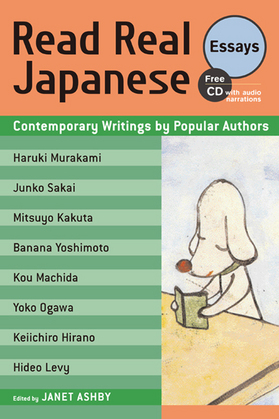
All the World is Yours. 2000. Acrylic on canvas. 200x190cm. Copyright (C) Yoshitomo Nara. Courtesy Tomio Koyama Gallery, Tokyo. Read Real Japanese Essays: Contemporary Writings by Popular Authors Edited by Janet Ashby. Published by Kodansha USA
KAKUTA: No. I never have been and I don't think I ever will, because my attention is on the now. The now, to me, is the young generation living in Tokyo and what will happen in their lives in the near future. My curiosity is limited to a few things. Of course I would like my books to be translated and read overseas, but if I'm too focused on that, I'll lose sight of what I really want to write. That's why I try not to think about it.
NUMANO: So what you want to convey is Japan's "now"?
KAKUTA: Well, to some extent. But I don't write my stories thinking that if I wrote this way or that, the book would sell overseas.
Hisoyaka na hanazono (Quiet Flower Garden), published in 2010, was about artificial insemination. There are sperm banks in the United States, but none that are legal in Japan. And I don't think there ever will be. There is a taboo about it here, and the taboo comes from the Japanese sensibility. I think Americans would not understand why it's so difficult for us to accept the idea, even if the novel were translated into English. No, I don't choose my themes or how I write so that the book will be read overseas.
NUMANO: I don't think you should.
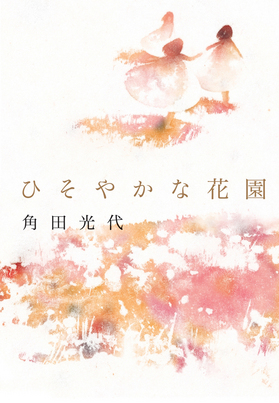
Hisoyaka na hanazono (Quiet Flower Garden) by Mitsuyo Kakuta (Publisher: Mainichi Newspaper Co. Ltd.)
KAKUTA: On the other hand, Hisoyaka na hanazono may overcome cultural differences and be understood by foreign readers if they find the story powerful enough. Ultimately, family problems and the secrets of one's birth are universal issues. Although the idea is a little different, the story of a human clone in Kazuo Ishiguro's Never Let Me Go, and other narratives with similar themes published today, indicate that we share the same concerns.
(Recorded on September 27, 2011 at Sanjo Conference Hall, the University of Tokyo)
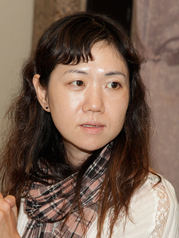 Kakuta Mitsuyo
Kakuta Mitsuyo
Author born in 1967. Won the 2005 Naoki Prize for Taigan no kanojo (Woman on the Other Shore) and the 2007 Chuo Koron Bungei Prize for Yokame no semi (The Eighth Day). Yokame no semi was made into a TV program in 2010 by NHK (Japan Broadcasting Corporation) and also into a movie directed by Izuru Narushima in 2011. She received the 22nd Ito Sei Prize for Literature for Tree House in 2010. Published a collection of short stories, Kanata no ko (The Child in the Distance), in December 2011.
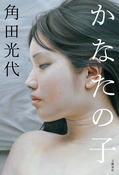
Kanata no ko (The Child in the Distance) by Mitsuyo Kakuta (Publisher: Bungeishunju Ltd.)
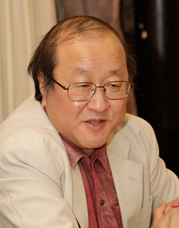 Mitsuyoshi Numano
Mitsuyoshi Numano
Professor of Literature, Department of Contemporary Literary Studies, the University of Tokyo. Specializes in and translates Polish and Russian literature. Deeply interested in contemporary Japanese literature and writes literary reviews. Sits on the editorial committee for Japanese Book News.
About Tree House
Set in Tokyo in the late 1990s, Tree House traces the history of an ordinary Japanese family running a Chinese restaurant. A family chronicle spanning three generations, the story unfolds against the backdrop of modern Japanese history, from the grandparents who emigrated to Manchuria around 1940, to the parents who are members of the generation involved in the campus unrest of the late 1960s, and the children who struggle to make sense of their lives in a society assailed by apocalyptic events such as terrorist attacks by a religious cult and a major earthquake.
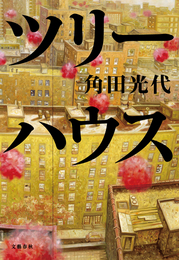
Tree House by Mitsuyo Kakuta
Hard cover, 472 pp
Publisher: Bungeishunju Ltd. (October 15, 2010)
ISBN-10: 416328950X
ISBN-13: 978-4163289502
Price: \1700
* You can find the following translated versions of Mitsuyo Kakuta's works at the JFIC Library located in the Japan Foundation headquarters. Please visit our library.
http://lib-opac.jpf.go.jp/mylimedio/search/search.do?mode=comp&keyword=kakutaMitsuyo
Information on translated Japanese literature is available on the Japan Foundation website. Eight titles of Mitsuyo Kakuta's works translated into Thai, German, French and English are listed on our website. Please take time to explore how Japanese works are translated into foreign languages.
Click here to find translated Japanese works.
Related Events
Back Issues
- 2023.12. 7 Movie Theaters aroun…
- 2023.6.16 The 49th Japan Found…
- 2023.4.24 The 49th Japan Found…
- 2022.12.27 Living Together with…
- 2022.12.27 Living Together with…
- 2022.8.12 Inner Diversity <…
- 2022.3.31 The 48th Japan Found…
- 2022.3.29 Beyond Disasters - T…
- 2021.11.29 Crossing Borders, En…
- 2021.4.13 Crossing Borders, En…


